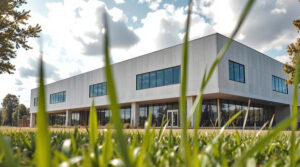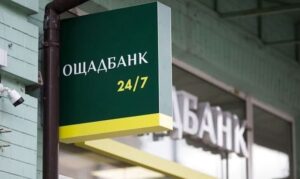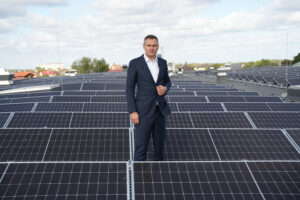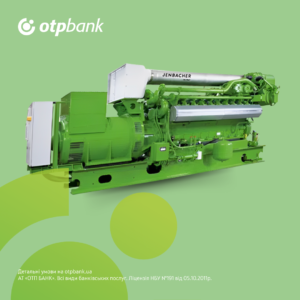
Where is the greatest potential for reducing carbon dioxide emissions, and which construction technologies can maximise the energy efficiency of buildings?
The construction and operation of buildings accounts for 39% of global CO2 emissions, of which 28% comes from operational emissions and the energy required for heating, cooling, and power supply, and 11% comes from the manufacture of materials and construction.
In the EU, only 25% of buildings are considered energy efficient, while in Ukraine the share of such buildings is about 5%. Consequently, the greatest potential for reducing carbon emissions lies in improving the energy efficiency of buildings and reducing the use of fossil fuels in the manufacture of building materials.
The use of energy-efficient building envelopes in combination with technologies such as heat pumps, renewable heat and electricity sources is the best way to create energy-independent buildings and achieve climate neutrality.
Rauta offers energy-efficient technologies using Ruukki products to create energy-efficient buildings.
Thanks to the special configuration of the joints and the presence of an EPDM seal in the sandwich panel locks, maximum airtightness of q50≤1 m3/(m2h) is achieved and energy consumption is reduced by up to 20% compared to conventional panels.
Highly efficient building envelopes made of Ruukki sandwich panels not only reduce overall carbon dioxide emissions and operating costs, but also provide greater comfort for people, enhance the company’s image, and increase the value of the building.
The use of Ruukki’s energy-efficient sandwich panels with special accessories and additional joint sealing can reduce a building’s energy consumption by up to 30%.
Green steel products
In 2023, Ruukki became the first company in the world to start producing sandwich panels and ventilated facade cladding from green steel, which is produced using hydrogen, electricity, and biogas instead of fossil fuels. The residual product of this production process is water, not carbon dioxide.
For facades and roofs that will be used in highly aggressive environments, Ruukki offers special Hiarc and Pural coatings, which provide excellent resistance to ultraviolet radiation, have increased resistance to dirt and scratches, and are also capable of reducing the heating temperature of the surface of enclosing structures.
Under the same conditions, energy-reflective coatings heat up 23% less than conventional coatings. This further reduces the amount of energy required to heat or cool rooms.
Rauta’s solution is a rooftop solar power plant that includes an enclosure made of Ruukki roof sandwich panels and modern monocrystalline solar panels with a set of special mounts.
Currently, the return on investment in RoofSolar for commercial buildings is 3.5-4 years.
Today, construction expertise is measured not in tons of concrete and steel, but in how little the construction and operation of buildings affect the environment. Improving construction technologies and using more energy-efficient materials and structures are essential steps for developers to take to preserve the planet.

The State of Serbia has signed an agreement with the European Bank for Reconstruction and Development (EBRD) to receive a loan of €50 million. The funds will be used to modernize centralized heating systems and improve their energy efficiency in various cities across the country.
The project aims to reduce energy consumption and harmful emissions, as well as operating costs for heat supply companies. The authorities emphasize that both institutions and ordinary consumers will feel the benefits.
As noted by Finance Minister Sinisa Mali, the signed agreement confirms Serbia’s strong commitment to the “green transition.” According to him, the project involves the reconstruction of heating substations, replacement of pipelines, installation of automation systems, and in some cases, the transition to environmentally friendly energy sources such as biomass or solar collectors.
Minister of Mining and Energy Dubravka Djedovic Handanovic added that the implementation of the project will ensure stable and high-quality heat supply in winter and will also help reduce dependence on imported energy sources.
The project will be part of a broader program to modernize municipal utilities, which the EBRD has already supported in the past. According to preliminary estimates, the modernization will reduce energy consumption by 25-30% in the upgraded systems.
EBRD representatives said they consider Serbia a key partner in the Balkans and will continue to finance sustainable projects in the energy, transport, and infrastructure sectors.
Source: https://t.me/

The state-owned Ukrgasbank (Kyiv) has granted Kryvyi Rih a seven-year loan of UAH 500 million to implement an energy conservation program in the city.
According to a statement posted on the bank’s website on Wednesday, the city will modernize its infrastructure, reduce heat loss, and improve energy efficiency, which should lower heating costs for residents.
According to the first deputy mayor of Kryvyi Rih, Yevhen Udod, a joint project will be implemented in the city, which provides for the modernization of the heating networks of the Kryvorizhteplomerezha municipal enterprise, the replacement of windows in the entrances of 199 residential buildings, and the reconstruction of premises for a new X-ray department at Hospital No. 1.
As specified to Interfax-Ukraine, the loan will be issued for a term of seven years, but other terms of the loan have not been disclosed.
According to the National Bank of Ukraine, in April 2025, Ukrgasbank ranked fifth (UAH 220.0 billion or 5.9%) among 60 banks operating in the country in terms of total assets.
As reported, in the first quarter of this year, Ukrgasbank issued two loans to Kryvyi Rih for a total amount of UAH 105.5 million for a term of seven years with a grace period of 12 months. The interest rate on the loan of UAH 87.6 million is 14.5% per annum in the first year and, from the second year, a variable UIRD 12M +3% with annual review, but not exceeding 23%. The second loan of UAH 17.9 million is issued at an interest rate of 16% per annum for the first year, which from the second year is UIRD 12M + 3.62% with annual review, but also not exceeding 23%. It was explained that 3.62% is 16% minus the current UIRD 12M at 12.38%.

The state-owned Oschadbank (Kyiv) has provided the Lviv City Council with a second loan of UAH 668 million for a term of five years to improve energy efficiency and municipal facilities.
“Oschadbank has signed another loan agreement with the Lviv City Council—the second in the last six months—for UAH 668 million,” Oschadbank CEO Serhiy Naumov said on Telegram.
Other terms of the loan have not been disclosed.
The total amount of loans provided by Oschadbank to the Lviv City Council under signed agreements has already exceeded UAH 1.5 billion, the bank said.
It is noted that the funds will be used to develop strategic urban infrastructure, in particular roads and housing and communal services, and one of the main areas of use will be improving energy efficiency.
“The money will go to a biogas plant with combined production of electricity and heat, an electrical substation, a boiler room with connection to a cogeneration unit, and investments in the company Lvivteploenergo,” Naumov added.
As reported, Oschadbank’s share in energy lending in the first quarter of 2025 exceeded 31%. During 2024-2025, contracts worth over EUR 85 million were signed in the corporate business segment with its participation, in particular for projects to develop energy generation and storage. These include the first case on the market of bank lending for a project to install 30 MW of energy storage systems to provide ancillary services, which was implemented by KNESS as part of a tender by NEC Ukrenergo.

Novus Ukraine LLC has invested UAH 1 billion 360 million in business development in 2023-2024, said Oleksiy Panasenko, Deputy CEO for Operations at NOVUS, in an interview with Interfax-Ukraine.
“In total, NOVUS invested UAH 1 billion 360 million in 2023-2024 to expand its network, own logistics center, restore damaged and open 16 new stores, and implement an energy efficiency program. In 2025, we plan to invest in the development of the company, in various formats, despite the war. Our goal is to provide every customer with access to quality products,” he said.
He added that in 2024, 17 new facilities have already been opened, including 14 Mi Market convenience stores in the capital region. In particular, on December 18, Mi Market was opened in the residential complex Respublika with an area of 103.8 square meters, on December 20, the opening of NOVUS in Kyiv at 12 Petropavlivska Street was announced, and two more Mi Markets will open by the end of the year.
“The Mi Market format is highly efficient due to its compactness and focus on everyday needs. We see great prospects for the development of new residential areas and are actively working on an expansion strategy. We are planning to scale this format in densely populated areas, this year we will open two more, in 2025 – another 50 new Mi Market stores,” said Panasenko.
He noted that the Mi Market convenience store format provides for an area of 50 to 400 square meters. Investments in the opening of such a store, including renovation, purchase of equipment and other operating expenses, amount to about UAH 5 million.
The company is also preparing to open two NOVUS stores in the near future. One on Petropavlivska Street on December 20 with a total area of 600 square meters, and one on Sofiiska Borshchahivka in the first half of next year with a total area of over 2 thousand square meters.
“Both of them are equipped with modern energy-efficient equipment for uninterrupted operation and products of our own production,” Panasenko added.
He added that at this stage the company has no plans to expand to other regions.
“Currently, we are strategically focused on developing in the capital region and creating the most comfortable conditions for customers. Our main bet now is on organic growth and opening new stores in Kyiv and the region. We have no detailed plans to expand to other regions. At the same time, we are open to any proposals and are ready to consider new regions if it is economically feasible. It is important for us not just to enter a new market, but to be able to develop and build an effective business in this region,” said Panasenko.
The NOVUS supermarket chain is developed by BT Invest (Lithuania), a company established in 2008 by former Sandora shareholders Raimondas Tumenas and the late Igor Bezzub. As of the end of December, the chain had 115 locations (85 NOVUS, 28 Mi Market convenience stores and two Hapaika discounters).
According to Opendatabot, as of July 2021, the owner of Novus Ukraine with a 100% stake in the authorized capital was Consul Trade House CJSC (Vilnius, Lithuania). The ultimate beneficiaries are Marina Poznyakova, Agne Ruzgienė, and Raimondas Tumenas.
According to the company’s financial results, in 2023, its revenue increased by 47% to UAH 23.6 billion, while its net loss decreased by 87% to UAH 310.7 million.

JSC OTP BANK has signed its first loan agreement with a Ukrainian company to finance distributed generation. Support in the amount of UAH 16.6 million for the purchase of a cogeneration gas piston unit will be provided toAVIS LLC.
“The issue of electricity supply is extremely important for the economy, for business and for every citizen. The Bank has set itself the goal of stimulating the development of the market for energy-independent solutions. We are ready to offer our customers the best deals and favourable conditions that will guarantee uninterrupted operation in the face of electricity shortages,” said Olga Volkova, Director of the Sales Department for Medium and Small Corporate Clients of OTP Bank.
The agreement is a concrete step by the Bank to implement the Memorandum on lending to energy infrastructure restoration projects. The document defines the strategic direction of the credit policy for financing investment energy projects. Assistance is provided for the construction and purchase of solar, wind, biogas, gas turbine and gas piston power plants, industrial batteries, and cogeneration units.
With the financial support of the Bank, a company that produces a wide range of food products will be able to purchase a Jenbacher JMS 320 GS-N.L. gas piston cogeneration unit with a capacity of 1,066 kW. The installation of such a unit will provide the company with maximum independence from the power grid and improve its economic efficiency. The equipment is beneficial because natural gas is an affordable fuel. In addition, it is a good investment in the future, as this modern technology does not have a negative impact on the environment.
As a reminder, on 25 June 2024, JSC OTP BANK and leading banks signed a Memorandum on lending to energy infrastructure restoration projects. Representatives of 17 financial institutions signed the document.